Breaking down the private DNA testing business model with the Lean Canvas.
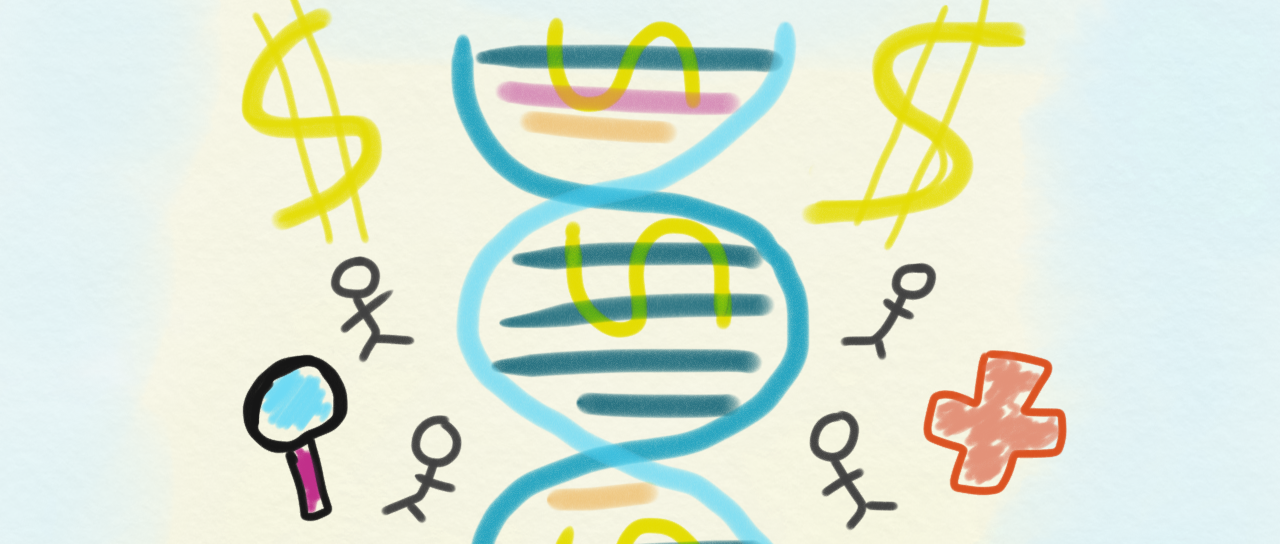
Imagine finding your birth mother after 47 years or discovering that you’re related to a president. This is the promise of private DNA services.
Headlines were made recently when Family Tree DNA, one of the largest private genetic testing companies whose home-testing kits enable people to trace their ancestry and locate relatives, revealed they were working with the FBI to help solve violent crimes.
Law enforcement using genealogy databases is nothing new, but this is the first time a private firm has agreed to work voluntarily to allow government services to use their databases. Founder Bennett Greenspan, justifies the decision by stating he is a crime fighter.
This peaked my curiosity — how do these businesses make money from what seems to be a very singular transaction model (you give me your DNA, and I give you a report), and why do people opt into this? It feels very much like a private company in this space benefits more than a consumer.
There are a few players in the private genetic testing game, each with a different spin on their business models:
- AncestryDNA
- 23andMe
- MyHeritage
- Living DNA
- Family Tree DNA
- National Geographic Geno 2.0
- AfricanAncestry
In this lean canvas I won’t be diving into any one of these specific businesses unless called out by name, but rather exploring the overall value propositions and potential revenue models of this growing industry.
Lean Canvas Takedown
Problem
- People want to understand where they came from — sense of belonging
- People want to understand and learn more about their family history
- People want to verify their ancestral roots
- People want to find lost family members
- Find biological parents
- Want to find if they have any serious health conditions
- Want to know how they could improve their health
- Novelty and curiosity — boredom
You may like to think the way you talk, dress, socialise and work is a good representation of who you are, but nothing is quite as quantitative as DNA. It’s our biological calling card with features we can observe (appearance) and secrets we can not. It’s alluring to think that buried in your cells are deeply personal anecdotes you could never know and may change the way you think about yourself forever.
The primary problem businesses in this sector are tackling is based on a psychological need to understand who you may be. It’s very compelling, and lends this product to be purchased through curiosity and even handed out as gifts at family reunions (something I would advise against).
Beyond that, genetic testing has more practical applications such as tracking down lost family members, finding what medical problems you are at risk from (limited evidence) and what diet and exercise routines you should be following to lose weight (even less evidence).
Customer Segments
- General public
- Genealogist enthusiasts
- Family history of disease
- Health enthusiasts
- Law enforcement
- Government Services
- Insurance companies
- Medical services
- Medical Research companies
The great thing about this product is that all your potential customers have DNA, so we are starting with a market size of just a few billion. Beyond pure curiosity and gift-giving of the product (itself a large market segment), there are niche segments who may be willing to pay higher prices for specific services.
Let’s start with business to consumer (B2C). Medical services such as helping you screen for genetic diseases and understanding your risk for serious conditions like cancer could be appealing if you have a suspected family history of genetic conditions. On the opposite end, you may just be very engaged with optimising your health and keen to take preventative action if any risk presents it self.
These medical services expand into general health complete with advice for exercise, diet and lifestyle which is where this app gets a bit scammy — I don’t think I need a DNA test to tell me that exercising, eating less red meat and sleeping well is going to positively impact my health…
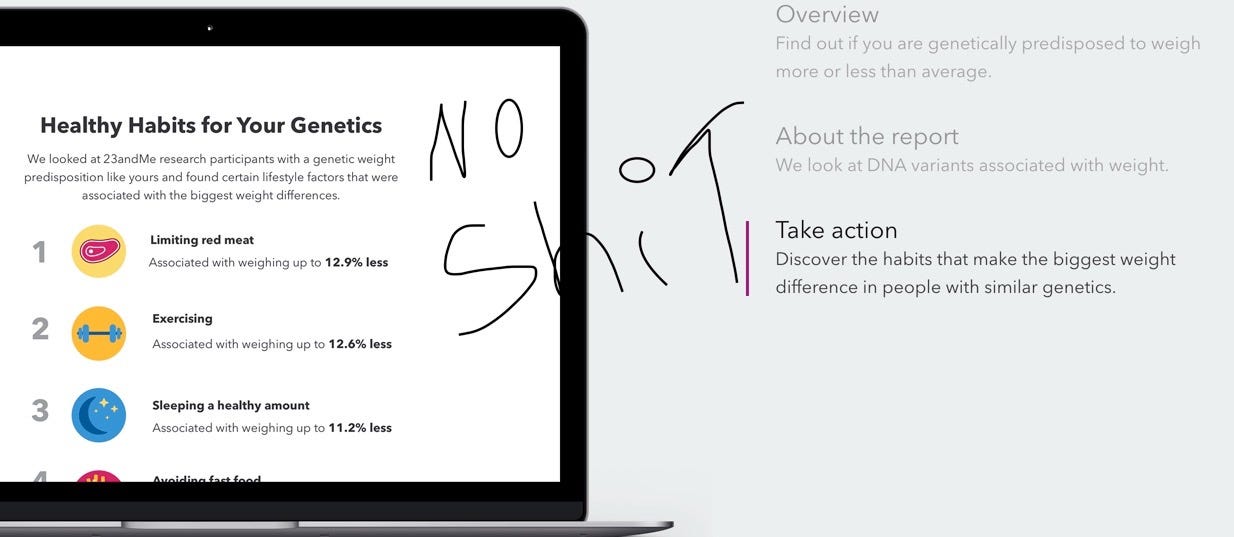
Where things get interesting is when we look at the potential business to business (B2B) side of these companies. Why settle for a single consumer transaction when there a many companies who would be interested in your data? The recent example as mentioned above is Family Tree DNA’s collaboration with the FBI. I can’t find evidence that money has exchanged hands, but there is certainly potential.
While investigators have used open-source sites such as GEDmatch, which is free, to find DNA matches and possible relatives, the arrangement companies like FamilyTreeDNA can increase access to 15 million people (60% of white americans). Researchers state that within two or three years, 90 percent of Americans of European descent will be identifiable from their DNA. That’s a bit insane.
Assuming your government is unlikely leverage DNA in way to exercise control over the population within your lifetime, who else would be interested is such a dataset?
Medical research companies could certainly benefit, with 23andMe already collaborating with Sanofi on developing 13 new drugs.
Your local hospital or doctor may find it useful as a pre-screening test for serious conditions and in future as a basis for genomic medicines (though the current generation of these commercial tests are not fit for this purpose). Health insurers/employers are also likely to be interested if it could potentially help them calculate premiums more accurately.
Solution
- Remote DNA testing service
- Accessible and personal insights based on a DNA test — family geographical origins, ethnic mixtures etc
- Results accessible through web portal
- Results easily shared with other services
From the consumer side, things are pretty straight forward. You get a box with a kit asking for a cheek swab or some saliva in a test-tube and these get mailed to a laboratory. In exchange for your genetic fingerprint, users can access an online dashboard (or mailed) filled with reports providing insights into your geographical heritage (what continents or countries your family is from), ethnic genetic makeup (50% Italian, 25% African, 5% Middle Eastern etc), genetic health problems and fun facts like if your may go bald or like bitter food.
These results should be easily shared or repurposed for new or third party services like finding a birth parent, long-lost cousins or perhaps a link to Trump or Attila The Hun.
Unfair Advantage
- Medical regulation approved insights
- Niche genetic reports which are difficult to replicate
- Size of your genetic database
- Third party integration services
Reading through the different company sites, a ‘selling feature’ which keeps reappearing is ‘owning and running proprietary laboratories’. This makes me think that in theory with access to a private laboratory, you could white-label a business like this. Many of the services offered between the competition seem quite similar — I’d be interested to know how many of these companies are private labels or generating genealogy reports based on open source software and databases.
One of the biggest unfair advantages you could attempt is getting your genetic tests approved by a medical regulatory body like FDA. Regulators will eventually start clamping down on this industry, and survival will depend not just being legally compliant, but also convincing customers on the safety and accuracy of your services (especially when making medical claims). This already landed 23andme in hot water with the FDA a few years ago for making dubious medical claims.
There is also a big data play here. Companies which manage to capture the majority of the market DNA may come to dominate in years to come. It may become impossible to compete with services created from large genetic sample sizes or reliant on finding matches within a database.
Revenue Streams
- DNA Test Kits
- DNA Analysis Tests
- Add-on DNA analysis tests — further insights
- Affiliate marketing for third party services
- Collaboration with government services
- Collaboration with law services
- Collaboration with pharmaceutical industry
The private genetic testing game at the moment mostly a single transaction model. You can purchase a kit then select the genetic tests you would like to perform. When new tests come onto the market customers can be retargeted. When indirect competitors require DNA for other services (like tracking down a lost relative i.e. Family Tree DNA) there is opportunity for affiliate sales by transferring your DNA from one service to another.
The bigger renewable revenue streams are likely to come from partnerships with government, law enforcement, healthcare, pharmaceutical development and potentially insurance. 23andMe was reported as getting as much as $300 million investment from pharmaceutical giant GlaxoSmithKline (GSK) to develop new drugs and therapies.
Access to a well catalogued DNA database complimented with additional information like physical attributes, likes, dislikes, social media activity etc opens up very interesting and lucrative partnerships too tempting to pass.
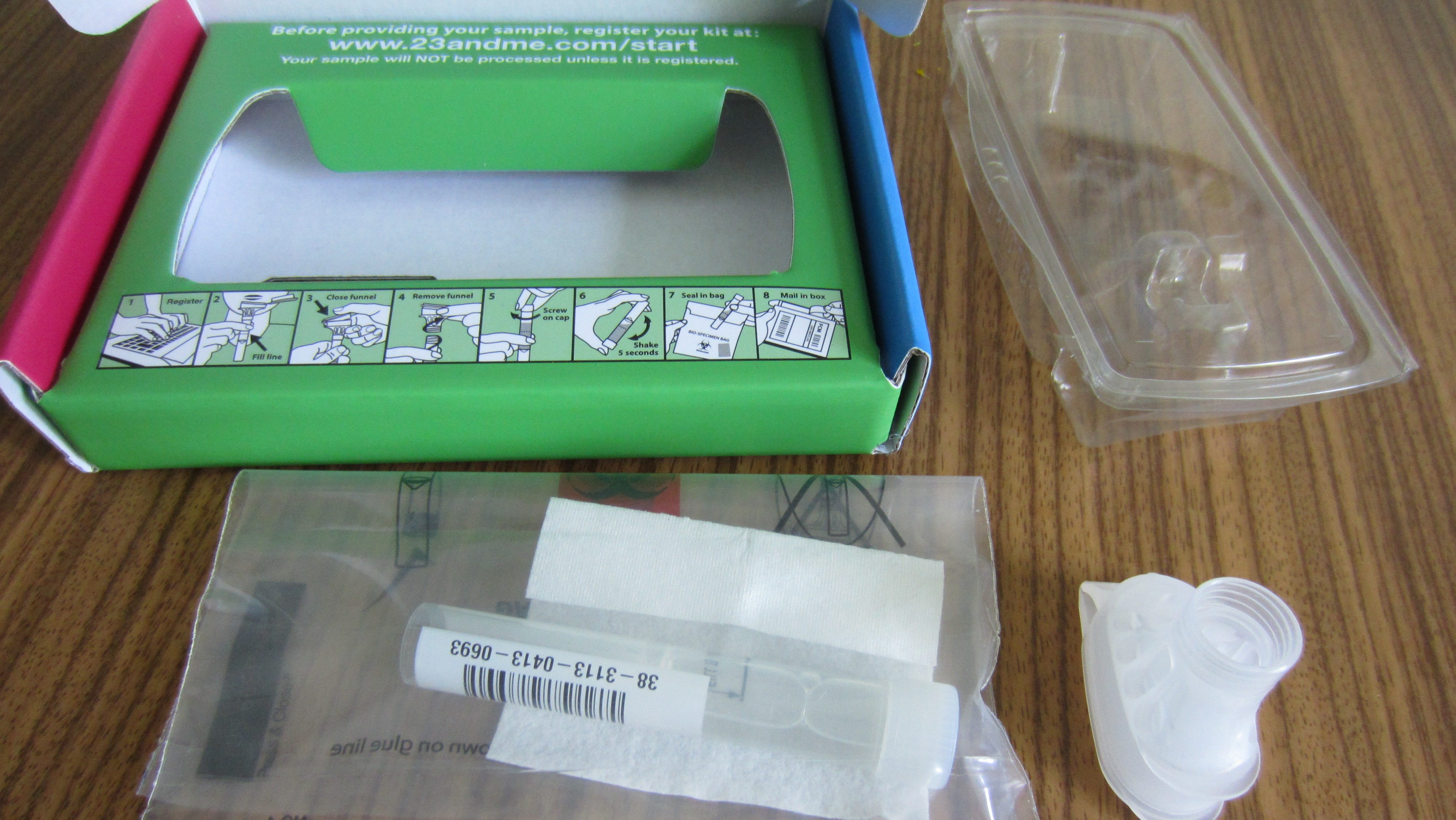
Cost Structure
- DNA Kits
- Laboratory setup & lab technicians
- Third party laboratory services
- Databases & Web Services
- Developers & Designers
- Office administration
- Marketing
- Sales
Depending on how you want to go into this industry, I image setting up and running a laboratory is going to be your biggest expenses. You could potentially farm out the lab work to a third party (some companies make a point of not doing this), which in theory would reduce any initial costs if you want to test a business idea.
I found a bunch of white labeled DNA Kits on Alibaba for around 6 a box which look pretty similar to 23andme.
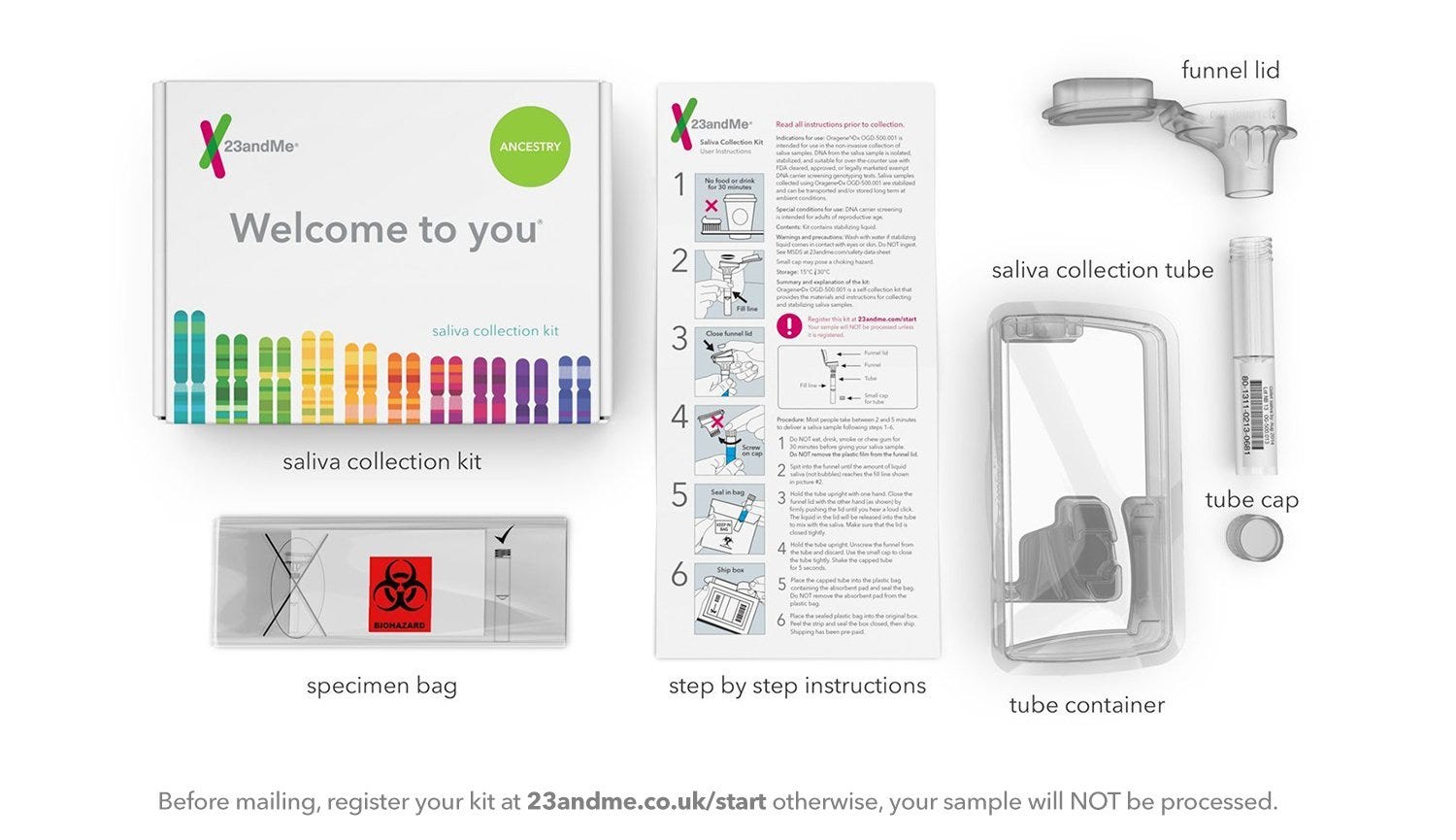
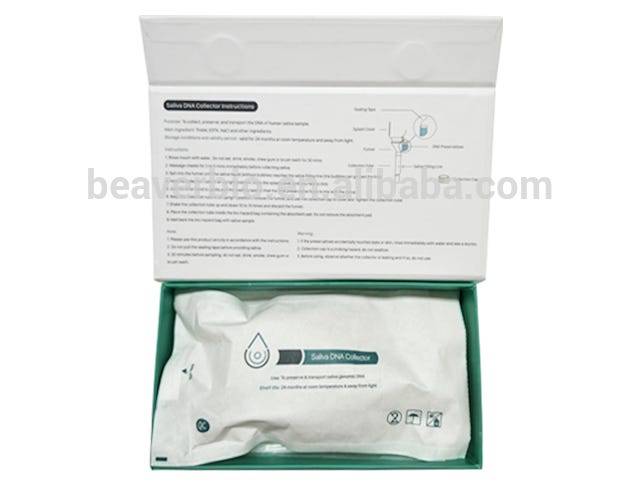
Hell, it looks like you could buy the entire laboratory for around $10,000.
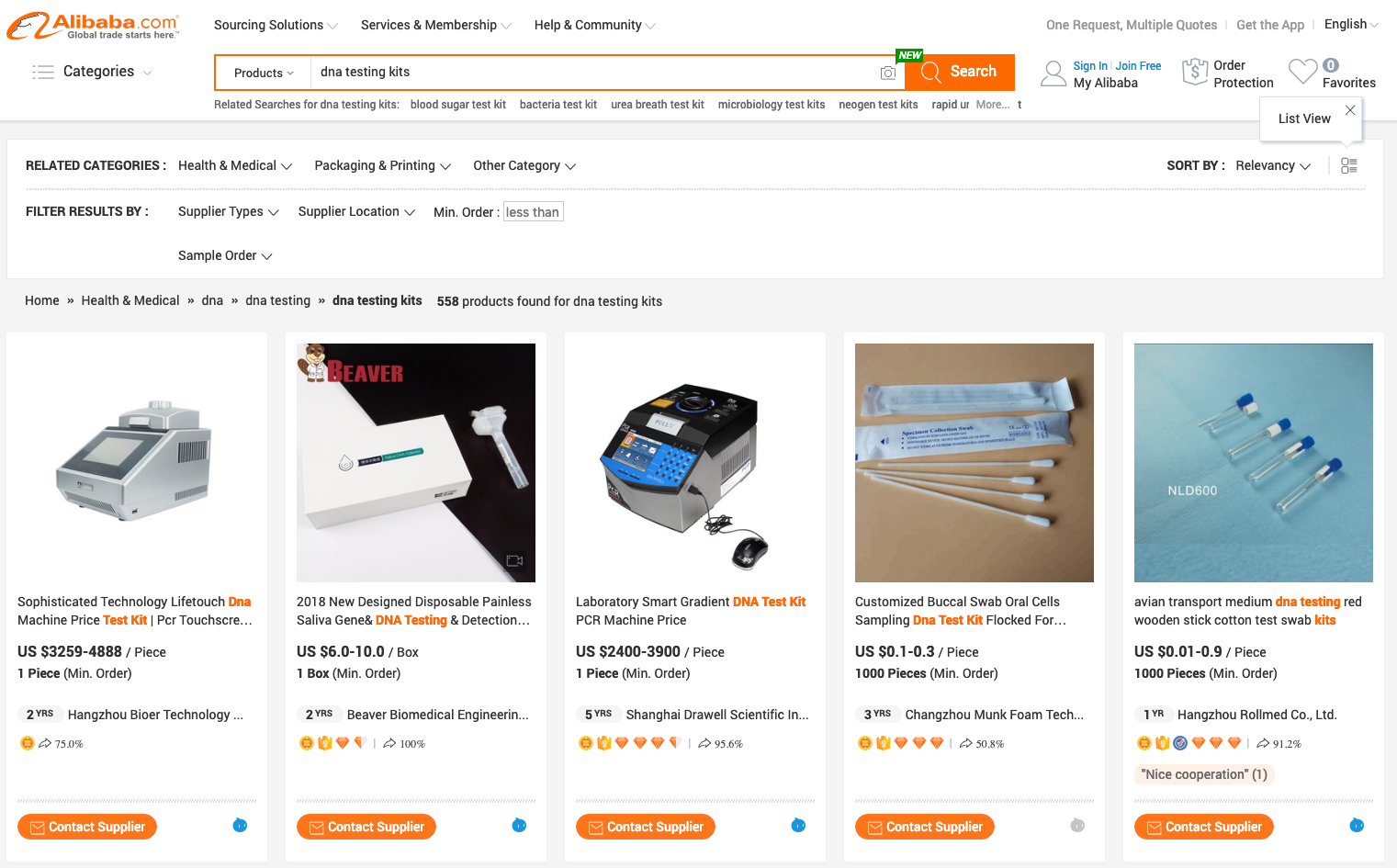
Key Metrics
Based on the singular transaction model, the number of new customers you can get through the door each month is going to be pretty important. In future i’m fairly certain securing lucrative contracts with other companies and organisations to share DNA databases will become the main source of revenue.
Final Thoughts
From Adrian
Please don’t do DNA test unless you really need it to solve a problem. If you think you are at risk of a genetic health condition, please see your doctor and get screening done in a safe, reliable and confidential way.
These genetic testing services are not only concerning from a privacy perspective, but also from a financial one. They are the genetic equivalent of the Cambridge Analytica Personality Test except in addition to taking your time, you are also paying hard cash to get profiled in a way that is unlikely to actually improve your life.
There are few guarantees that once a private company has your DNA they will not share or sell it when the opportunity arises — the revenue potential is too large to ignore. These companies could at least pay us dividends if our DNA helps invent new medications or help produce scientific breakthrough products.
From a privacy perspective, this is actually is actually something I would like to see Tim Berners-Lee’s (inventor of the World Wide Web) startup ‘Solid’ tackle to help us gain the benefits of crowd-sourced DNA, but with the ability to control how our information is accessed.
Who knows, maybe we will be all doing DNA tests in our kitchens by this time next year
From Jenny
I don’t get how DNA tests became big with consumers but I am slow to judge the startups for finding a B2B revenue stream. The truth is if I was doing Business Development for any of them that would have been my move.
Like the power of social media the power of these DNA tests grows with the number of customers. So maybe before we create a monster that owns all of our genomes and is happy to sell it to the top payer, we should stop buying this snake oil. Knowing that your great great parents were serfs in the Baltics, or that your dad is not your biological father will not change who you are.